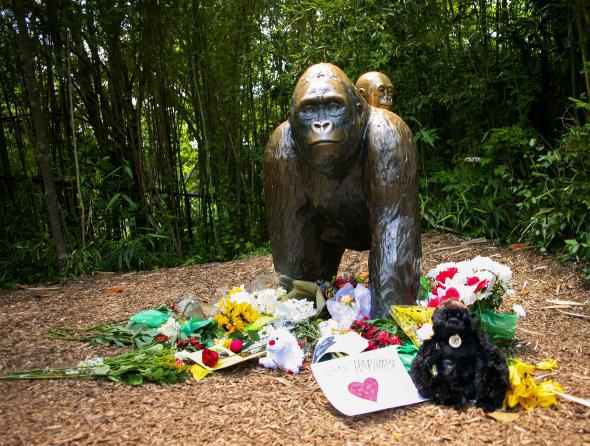High-profile animal deaths are a reliable source of moral outrage. This comes from frustration with human beings’ inability to cohabit respectfully with the other creatures on our planet. Also, getting sad about these losses comes easy, as the grief requires little in the way of change to one’s behavior or ethics.
On Saturday, a 3-year-old boy found his way into the silverback gorilla enclosure at the Cincinnati Zoo; zookeepers made the decision to shoot and kill a gorilla named Harambe in order to protect the boy. Predictably, outraged ensued.
The circumstances surrounding the killing are—as is the case in most split-second decisions made under extreme duress—debatable. Some experts, including Cincinnati Zoo Director Thane Maynard, pointed out that these animals are enormous, incredibly strong, and unpredictable, and that the only way to guarantee the boy’s safety was to kill Harambe. Others, including primatologist Frans de Waal, remain uncertain as to whether the boy was really in danger and whether such measures were necessary. But people—with their aversion to uncertainty and villianless tragedy—need someone to blame and are targeting the boy’s parents with their ire.
A petition on Change.org with more than 300,000 signatures states the following:
This beautiful gorilla lost his life because the boy’s parents did not keep a closer watch on the child. We the undersigned believe that the child would not have been able to enter the enclosure under proper parental supervision. … We the undersigned want the parents to be held accountable for the lack of supervision and negligence that caused Harambe to lose his life. We the undersigned feel the child’s safety is paramount in this situation. …We the undersigned actively encourage an investigation of the child’s home environment in the interests of protecting the child and his siblings from further incidents of parental negligence that may result in serious bodily harm or even death.
This condemnation of the parents is making its way around social media, too. Comedian Ricky Gervais—not, last I checked, a primatologist—tweeted: “It seems that some gorillas make better parents than some people.” It has more than 5,000 retweets and 11,000 likes. D.L. Hughley tweeted that he thinks the boys’ parents should go to jail. There’s a meme that reads: “I was killed because a bitch wasn’t watching her child.” And de Waal concludes his popular Facebook post with: “At least, we can all agree that people should watch their children!” There are those, including PETA, who are criticizing the zoo for failing to have an adequate barrier around the gorilla enclosure. But that critique is gaining less traction than the one focused on the boy’s parents.
Children can’t always be watched, even by the most competent of parents. I am also a mother of a 3-year-old boy and have had to take my eyes off of him in a public setting for a variety of reasons, many of which involve digging through the bottom of the stroller to locate sunscreen or his water bottle. Other times it’s to assess oncoming traffic or to find the cereal he absolutely must eat in the morning. The brief absence of surveillance involves a calculated risk, sure, but it’s one parents must take in order to take care of their families. While I can’t speak about the competence of the parents of the boy who fell into the gorilla enclosure, I can say with certainty that there is no parent out there who has never looked away from his or her child for even a moment.
There’s also a layer of deep irony to this critique. Today’s mothers and fathers are constantly denounced as helicopter parents—micromanagers and overcoddlers of their children who will never learn how to be independent. The finger-pointing at the parents of the boy at the zoo suggests that there is no such thing as the right amount of parenting. Things go wrong because either we’ve done too little or done too much. Either way, it’s all our fault.
I understand the sadness about Harambe. I am sad about Harambe. But the rage would be much better spent on supporting conservation efforts of silverback gorillas than on demanding that the parents of the boy be held accountable. They’ve already been through enough.
